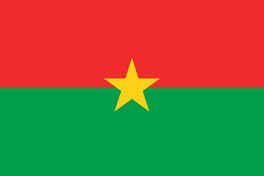 |
République du Burkina FasoIndependence 5 August 1960
History If any country can be called a miraculous survivor of colonization, it's Upper Volta (the colonial name of Burkina Faso). However, perhaps it's no wonder, given the persistence of the remarkably organized and independent political units of the great empires and kingdoms – Ghana, Mali, Songhai, Ségou and Macina – that mark nearly a thousand years of West African history, from the 10th century to the 19th century. Among these political entities, 'independence' does not at all translate into antagonism and conflict. While the Mossi Kingdoms, including Ouagadougou, maintain their local cult beliefs even while Islam spreads across West Africa, the 'joking relationships' that bind all Burkinabé peoples and their neighbours, from Senegal to Niger, attest to long-established collective familiarity and exchanges. In Ouagadougou itself, the Mogho Naba continues the royal rituals of bygone days. French colonization penetrates the territory using extreme brutality, the most well known episode being Voulet-Chanoine's violent 1897 mission to establish control. 'Pacification' takes a long time, stymied by strong and widespread resistance. Such bravery by the Voltaic peoples convinces the French army to recruit them en masse to serve in the First World War, causing a 1916 insurrection the French found difficult to crush. The colony is created officially in 1919 when it becomes part of French West Africa (AOF). The rigidity of the French colonial system and the jobs and salaries available in the Gold Coast (modern Ghana) attract many of the young to emigrate to the English colony, to the great displeasure of French plantation owners in Ivory Coast and to the detriment of post war development projects. In 1932, Upper Volta is wiped from the map after being redistributed among its three neighbours, Niger, French Sudan (modern Mali) and especially Ivory Coast. It is reborn in 1947, when the colonial administration, disturbed by the close relations between Ivorian politicians and the French communist party, restores a reputedly politically conservative colony. The march toward independence takes place smoothly within the AOF framework. However, the country suffers from political rivalries that endure long after 1960 and culminate in rebellion, even revolution, by young officers led by Thomas Sankara. In power from 1983 to 1987, he renames the country Burkina Faso ('Country of Honest Men'), in a spirit of nationalism and pan-Africanism. Continuous migration toward Ivory Coast, first imposed by the French and now a sour legacy of colonization, is a constant source of tension between the two countries. Elikia M'Bokolo (EHESS/UNIKIN) |


